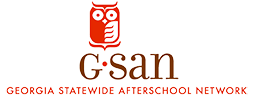High quality afterschool and summer learning programs are an ideal opportunity to foster positive behavioral health, which increases a child’s sense of well-being, supports healthy relationships, and enables children to achieve their full academic potential. These programs promote positive behavioral factors like positive decision-making skills, self-control, and self-awareness, provide supportive environments, reduce children’s chances of developing substance use disorders, and have been linked to improved work habits and classroom behavior, gains in reading and math, and increased school attendance and graduation rates.
Behavioral Health Needs in Afterschool & Summer Programming Report Georgia Statewide Afterschool Network
Afterschool and Summer Learning Supporting Behavioral Health Factsheet Georgia Statewide Afterschool Network
21st CCLC and Georgia APEX Collaboration Factsheet Georgia Statewide Afterschool Network
The Role of Afterschool in Social and Emotional Learning Issue Brief Afterschool Alliance
Behavioral Health Access Map Georgia Department of Behavioral Health and Developmental Disabilities & Georgia Health Policy Center
Behavioral Health Glossary Georgia’s Department of Behavioral Health and Developmental Disabilities
Social Emotional Learning Activities Centervention
SEL Toolkit Act for Youth
Linking Schools and Afterschool Through Social and Emotional Learning American Institutes for Research
The In-School and Afterschool Social and Emotional Learning Connection American Institutes for Research
Planning tool for OST staff and school leaders to complete collaboratively with the aim of addressing the SEL needs of young people
Healthy Resilient Communities Resources Page Resilient Georgia
Community Resources National Alliance on Mental Illness Georgia
COVID-19
Taking Care of Your Behavioral Health – Tips for Social Distancing, Quarantine, and Isolation During an Infectious Disease Outbreak US Substance Abuse and Mental Health Services Administration (SAMHSA)
A Trauma-Informed Approach to Teaching through Coronavirus Teaching Tolerance
How to Help Someone with Anxiety or Depression During COVID-19 Mental Health First Aid USA
Mental Health and COVID-19 American Foundation for Suicide Prevention
COVID-19 Resource Page Georgia Department of Behavioral Health and Developmental Disabilities
COVID-19 Resources Mental Health America of Georgia
Crisis lines, webinars, and related information for coping during COVID-19
COVID-19 and Your Mental Health Mayo Clinic
Resources to Support Mental Health and Coping with the Coronavirus (COVID-19) Suicide Prevention Resource Center
COVID-19 Mental Health Resource Hub PsychHub
Free resource hub of the nation’s most credible mental health organizations to help people address their mental health needs during the COVID-19 pandemic
Services
How Do I Find DBHDD Services? Georgia Department of Behavioral Health and Developmental Disabilities
United Way 2-1-1
Call 2-1-1 to speak with a live highly trained professional in your area or click here to find local services.
The Georgia Crisis and Access Line (GCAL)
For immediate access to routine or crisis services, please call GCAL at 1-800-715-4225. GCAL is available 24 hours a day, 7 days a week and 365 days a year to help you or someone you care for in a crisis. Georgia’s youth can access GCAL’s services via text and chat through an app called My GCAL.
Trainings
Mental Health Academy Mental Health America of Georgia
The Mental Health Academy is a training program to educate non-mental health professionals to better understand mental illness/addictions and provide effective response options for de-escalation.
Child Welfare Training Collaborative Georgia State University School of Social Work
By request trainings designed to be offered in your community, school or online to build collaborative skills and relationships with professionals in your area around issues of child welfare
